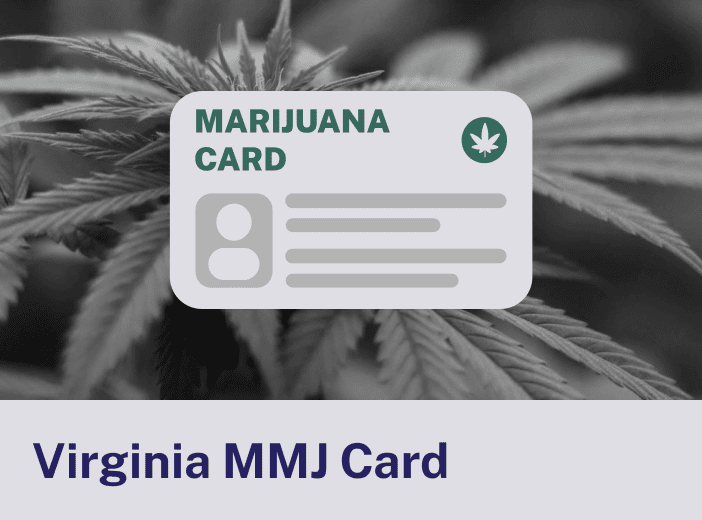How To Get a Medical Marijuana Card in Virginia
- Virginia Cannabis
- Virginia Medical Marijuana
- Medical Marijuana Card
What is an MMJ Card in Virginia?
In Virginia, a medical marijuana (MMJ) card is a patient identification card issued by the Virginia Cannabis Control Authority to any adult resident who registers as a medical marijuana patient. On July 1, 2022, Virginia House Bill HB933 removed the requirement for a medical marijuana card for any patient, parent, or legal guardian participating in the state’s medical cannabis program. While anyone can still get a digital medical marijuana card in Virginia, this document is optional and not required to purchase cannabis from medical marijuana dispensaries in the state. Virginia only requires a Written Certification for the Use of Medical Cannabis issued by a medical practitioner in order to purchase and possess medical cannabis.
Who Can Apply for an MMJ Certification in Virginia?
Eligible state-licensed healthcare providers in Virginia can issue medical marijuana certifications to residents diagnosed with debilitating medical conditions they believe would benefit from medical cannabis use. Minors and vulnerable adults are required to name their legal guardians or parents, on their written certifications, as caregivers.
Can a Minor Obtain a Medical Marijuana Certification in Virginia?
Yes. Minors in Virginia seeking access to medical marijuana are required to obtain Written Certifications for the Use of Medical Cannabis from their physicians. These documents must name their parents or legal guardians.
What Conditions Qualify for Medical Marijuana Cards in Virginia in 2026?
The Commonwealth of Virginia no longer lists specific qualifying medical conditions for patients seeking medical cannabis access. Rather, Section 54.1-3408.3 of the Code of Virginia empowers state-licensed and eligible healthcare providers to determine whether their patients’ conditions can benefit from medical marijuana use.
How Do I Apply for an MMJ Card in Virginia in 2026?
To get a Virginia medical marijuana card, start by making an appointment with an eligible health practitioner to obtain a Written Certification for the Use of Medical Cannabis. Those eligible to issue this written certification in Virginia include practitioners of medicine or osteopathy, or physician assistants, licensed by the Board of Medicine; or nurse practitioners jointly licensed by the Board of Medicine and the Board of Nursing.
The practitioner would submit this written certification to the Virginia Medical Cannabis Program. Subsequently, the applicant will receive an email to access their digital medical cannabis card. This digital card validates the certification and both documents are linked together. You may present this digital card along with a government-issued ID at a dispensary to purchase medical cannabis. When the dispensary scans the card, they will be able to access the written certification linked to it. You may print the digital card if you so wish.
How Does a Primary Caregiver Get a Virginia Medical Cannabis Certification?
Caregivers do not get medical cannabis certifications in Virginia. Rather, they are named on the certifications issued to the patients they represent. To be designated a caregiver, the parent or legal guardian of a minor must accompany them to their consultation with the practitioner providing a Written Certification for the Use of Medical Cannabis.
How Long Does it Take to Get a Virginia Medical Cannabis Certification?
A Written Certification for the Use of Medical Cannabis is available as soon as an eligible provider issues one to a qualifying patient they deem suitable for medical cannabis treatment. The digital card issued alongside the certification is immediately available on the patient’s profile on the Virginia Medical Cannabis portal.
Getting a Virginia Medical Marijuana Certification Online
Virginia allows eligible healthcare providers to use telehealth services to conduct patient assessment and deliver care. Therefore, it is possible to obtain a Virginia medical cannabis certification online by consulting with a state-licensed provider through the use of interactive telemedicine sessions.
How Much Does the Optional Medical Marijuana Card Cost in Virginia?
In Virginia, registration in the state’s medical cannabis program is optional. A patient or their caregiver (parent, guardian, or registered agent) only needs to present their written certification at the point of purchase. However, a caregiver is required to register if their name is not on their patient’s certification. If a patient chooses to register with the CCA, they will pay an annual fee of $50 while a caregiver pays $25 in application fee.
How Do I Renew My Medical Marijuana Card?
Renewal of Virginia medical marijuana cards can be done annually through the Patient Portal. Caregivers pay $25 for renewal while patients pay $50 for the renewal of the MMJ cards.
What Documents Do I Need to Apply for a Medical Cannabis Card in Virginia?
Documents needed to apply for a medical cannabis card in Virginia includes:
- A Written Certification for the Use of Medical Cannabis
- A government-issued ID such as a State ID or driver’s license
Are My Details Kept Confidential When I Apply for a Medical Marijuana Card in Virginia?
Yes, the health insurance portability and accountability act (HIPAA) protects specific health information of an individual from disclosure without their consent by "covered entries" which includes dispensaries. Health information includes identifiers such as names and addresses of patients.
What Information Appears On A Virginia Medical Marijuana Card?
Patients information that appears of a Virginia medical marijuana card includes the following:
- The full legal name of the medical marijuana patient
- Photo of the medical marijuana patient
- A six-digit patient identification
- The date the card was issued
- Patient's date of birth
- The card's expiration date
Can Someone Track Me Down Through The Virginia Registry?
No, this depends on whether the registry is HIPAA compliant or not. Virginians should note, registries that contain patient records such as dispensaries and other healthcare providers are protected under HIPAA, as "covered entries" hence, these registries can not be used in tracking patients down.
Apply For a Medical Cannabis Card
Book an Appointment